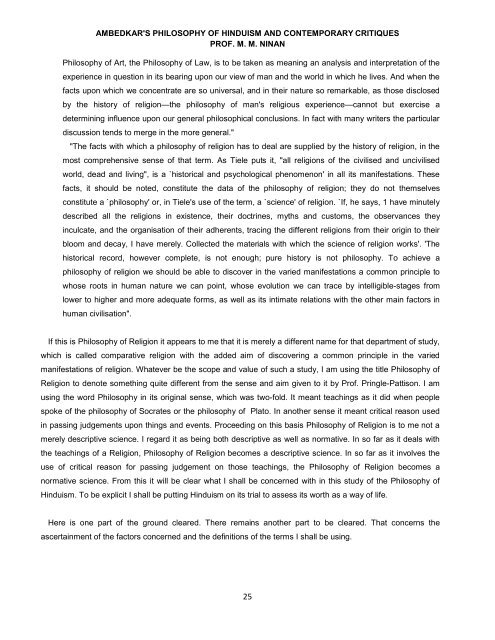Ambedkar-Philosophy of Hinduism
You also want an ePaper? Increase the reach of your titles
YUMPU automatically turns print PDFs into web optimized ePapers that Google loves.
AMBEDKAR'S PHILOSOPHY OF HINDUISM AND CONTEMPORARY CRITIQUES<br />
PROF. M. M. NINAN<br />
<strong>Philosophy</strong> <strong>of</strong> Art, the <strong>Philosophy</strong> <strong>of</strong> Law, is to be taken as meaning an analysis and interpretation <strong>of</strong> the<br />
experience in question in its bearing upon our view <strong>of</strong> man and the world in which he lives. And when the<br />
facts upon which we concentrate are so universal, and in their nature so remarkable, as those disclosed<br />
by the history <strong>of</strong> religion—the philosophy <strong>of</strong> man's religious experience—cannot but exercise a<br />
determining influence upon our general philosophical conclusions. In fact with many writers the particular<br />
discussion tends to merge in the more general."<br />
"The facts with which a philosophy <strong>of</strong> religion has to deal are supplied by the history <strong>of</strong> religion, in the<br />
most comprehensive sense <strong>of</strong> that term. As Tiele puts it, "all religions <strong>of</strong> the civilised and uncivilised<br />
world, dead and living", is a `historical and psychological phenomenon' in all its manifestations. These<br />
facts, it should be noted, constitute the data <strong>of</strong> the philosophy <strong>of</strong> religion; they do not themselves<br />
constitute a `philosophy' or, in Tiele's use <strong>of</strong> the term, a `science' <strong>of</strong> religion. `If, he says, 1 have minutely<br />
described all the religions in existence, their doctrines, myths and customs, the observances they<br />
inculcate, and the organisation <strong>of</strong> their adherents, tracing the different religions from their origin to their<br />
bloom and decay, I have merely. Collected the materials with which the science <strong>of</strong> religion works'. 'The<br />
historical record, however complete, is not enough; pure history is not philosophy. To achieve a<br />
philosophy <strong>of</strong> religion we should be able to discover in the varied manifestations a common principle to<br />
whose roots in human nature we can point, whose evolution we can trace by intelligible-stages from<br />
lower to higher and more adequate forms, as well as its intimate relations with the other main factors in<br />
human civilisation".<br />
If this is <strong>Philosophy</strong> <strong>of</strong> Religion it appears to me that it is merely a different name for that department <strong>of</strong> study,<br />
which is called comparative religion with the added aim <strong>of</strong> discovering a common principle in the varied<br />
manifestations <strong>of</strong> religion. Whatever be the scope and value <strong>of</strong> such a study, I am using the title <strong>Philosophy</strong> <strong>of</strong><br />
Religion to denote something quite different from the sense and aim given to it by Pr<strong>of</strong>. Pringle-Pattison. I am<br />
using the word <strong>Philosophy</strong> in its original sense, which was two-fold. It meant teachings as it did when people<br />
spoke <strong>of</strong> the philosophy <strong>of</strong> Socrates or the philosophy <strong>of</strong> Plato. In another sense it meant critical reason used<br />
in passing judgements upon things and events. Proceeding on this basis <strong>Philosophy</strong> <strong>of</strong> Religion is to me not a<br />
merely descriptive science. I regard it as being both descriptive as well as normative. In so far as it deals with<br />
the teachings <strong>of</strong> a Religion, <strong>Philosophy</strong> <strong>of</strong> Religion becomes a descriptive science. In so far as it involves the<br />
use <strong>of</strong> critical reason for passing judgement on those teachings, the <strong>Philosophy</strong> <strong>of</strong> Religion becomes a<br />
normative science. From this it will be clear what I shall be concerned with in this study <strong>of</strong> the <strong>Philosophy</strong> <strong>of</strong><br />
<strong>Hinduism</strong>. To be explicit I shall be putting <strong>Hinduism</strong> on its trial to assess its worth as a way <strong>of</strong> life.<br />
Here is one part <strong>of</strong> the ground cleared. There remains another part to be cleared. That concerns the<br />
ascertainment <strong>of</strong> the factors concerned and the definitions <strong>of</strong> the terms I shall be using.<br />
25


















